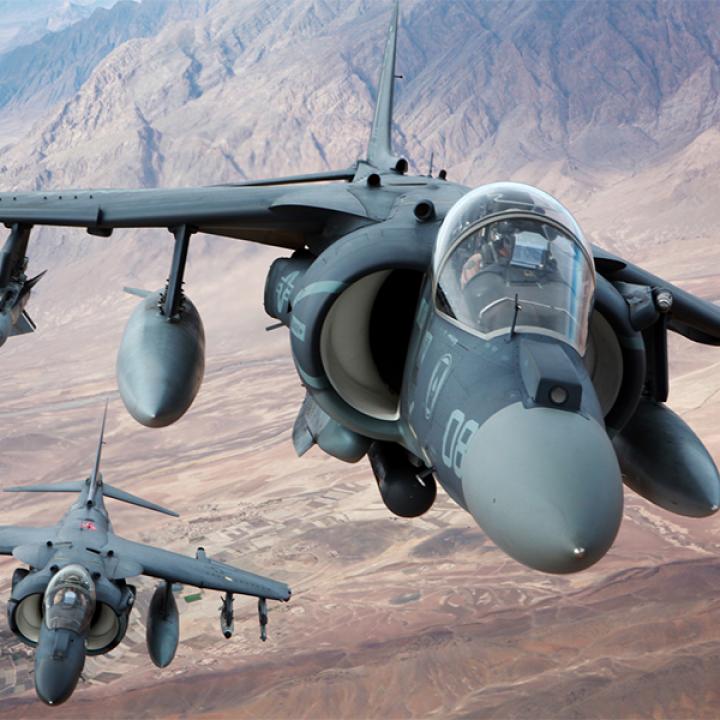
- Policy Analysis
- Policy Alert
U.S. Strikes Islamic State in Libya

Together with a domestic oil deal, the American airstrikes could mark an important turn for the war-torn nation.
The Department of Defense confirmed yesterday that the United States had conducted airstrikes on the Islamic State (IS) stronghold of Sirte, Libya. This development, together with a long-overdue agreement on oil production, represents a much-needed win for the Government of National Accord (GNA), as Libya's interim government is known. Nevertheless, Libya still confronts deep instability.
ATTACKS A RESPONSE TO LIBYAN REQUEST
According to Pentagon spokesman Peter Cook, the "precision" strikes on IS targets were conducted at the GNA's request, consistent with the overall U.S. approach to countering the jihadist group by supporting "capable and motivated local partners." Following considerable progress in early June by Libyan militias against IS in Sirte, they encountered stiff resistance and suffered significant casualties from snipers and improvised explosive devices when trying to advance on the central part of the city and the Ouagadougou Conference Center, formerly used by Libyan leader Muammar Qadhafi to host Arab and African dignitaries. The airstrikes represent an additional U.S. step beyond the previously acknowledged provision of intelligence and tactical advice to GNA-aligned militias in the battle for Sirte. According to U.S. Africa Command, manned and unmanned aircraft conducted the strikes, which will likely continue in the coming days. The U.S. special envoy to Libya, Jonathan Winer, tweeted that "U.S. forces will not engage in ground operations." Cook elaborated, "We do not expect U.S. forces to be part of this specific operation."
The Libyan request for U.S. help was meaningful, especially when contrasted with the GNA's public response to a Benghazi helicopter crash that killed three French Special Forces members in July. After the crash, the GNA condemned the French presence in the city and accused them of "foreign interference," an always-sensitive issue in Libya. The reality was more complicated. The French were most likely providing quiet assistance in Gen. Khalifa Haftar's battle against non-IS Islamist forces in the country. For their part, Haftar and his forces remain stubbornly opposed to the GNA, and it is unclear whether the GNA had tacitly agreed to the French presence in Benghazi or whether the Libyan governing body was truly caught by surprise. Yesterday's press statement by GNA prime minister Fayez al-Sarraj emphasized that the United States is coordinating closely with and seeking to strengthen the GNA. Further, Sarraj emphasized that the airstrikes came at the GNA's request, will be time-limited, and will not extend beyond the Sirte area.
A PROMISING OIL DEAL
On the oil front, the UN Support Mission in Libya (UNSMIL) brokered a deal between the GNA and the Petroleum Facilities Guard (PFG) that could boost Libyan exports above current levels of roughly 300,000 barrels per day (b/d). Until now, the PFG has effectively blocked exports from the major terminals in the east -- Ras Lanuf, Zuwaitina, and Sidra. PFG head Ibrahim Jadhran initially seized the terminals in 2013-2014 as a political maneuver to promote eastern federalism, or greater political independence for Libya's eastern region. But as the months wore on and IS emerged in Sirte, threatening the PFG's influence and territory, Jadhran's forces aligned with GNA fighters from Misratah, which likely improved his political ties with the GNA. In July, the head of UNSMIL made a much-publicized visit to Jadhran, paving the way for an agreement to lift the siege on the facilities in exchange for an unknown payment.
The secrecy and money at stake threatened to scuttle the deal. The chairman of Libya's National Oil Corporation (NOC), in a scathing letter, charged that the UNSMIL action "sets a terrible precedent and will encourage anybody who can muster a militia to shut down a pipeline, an oil field, or a port to see what they can extort." Once the deal was apparently modified to indicate that the PFG would only receive retroactive salary payments, the NOC endorsed the deal, and projected that production could increase to 900,000 b/d by year's end. That estimate may be overly optimistic given the damage to all components of Libya's production capacity and the potential for additional spoilers, including from Haftar-aligned forces, not just terrorists. Still, in addition to the benefits of increased production, the agreement with the PFG demonstrates a first instance of successful GNA negotiation with a major militia constituency with political influence.
CONCLUSION
In the last several days, the GNA has taken notable steps forward, building some momentum toward establishing its credibility. It has a very long way to go, though, and every day will present significant political, economic, and security struggles. Shortages of medical supplies -- as well as electricity and various staples -- remain a constant challenge, as illustrated by the recent closure of Tripoli Hospital’s emergency department. And as the French Special Forces incident demonstrated, assuaging segments of Libyan society over the U.S. airstrikes will prove politically challenging. Yet if the strikes can weaken IS holdouts to the point that they can be captured by Libyan forces, such an outcome would not only strengthen the GNA but also benefit America's standing in Libya, potentially clearing the way for further U.S. contributions to Libya's stability.
Ben Fishman, a former research associate at The Washington Institute, is the editor of the 2015 book North Africa in Transition: The Struggle for Democracies and Institutions. He served on the National Security Council staff from 2009 to 2013, including as director for North Africa and Jordan.



